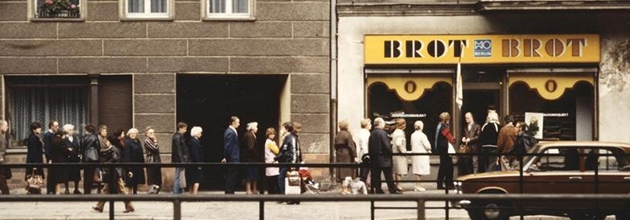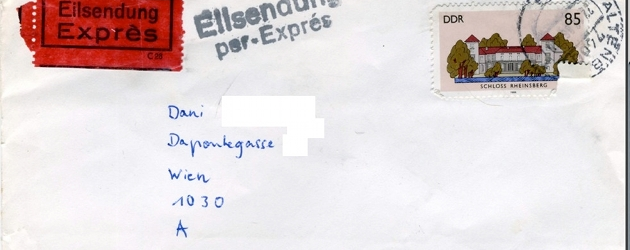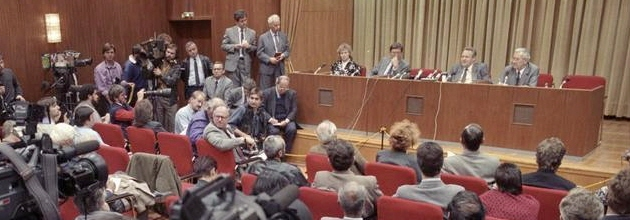For me, reading Mary Fulbrook’s The People’s State: East German Society from Hitler to Honecker (also at Amazon UK, CA, DE [english] and DE [deutsch]) is like an act of intellectual integrity. My normal, day-to-day inclination during conversation is to do nothing but bash East Germany, that dictatorship of communist elites that repressed its people, shot those trying to leave, sent murderous goons outside its borders to eliminate political enemies and perpetuated the lie of a successful “actual existing socialism” while running its economy into the ground.
Judging from that previous sentence, I’ll still be bashing that second German dictatorship (along with first) long after I finish Professor Fulbrook’s book.
But what I won’t do anymore is try to hide and ignore something which I already knew but which was never explained to me as well as Professor Fulbrook has done: the simple yet politically inconvenient fact that many (most?) citizens of East Germany led normal lives, did not feel threatened by the State and even participated — with some measure of satisfaction — in their own governance.
Fulbrook confronts this issue head on. She knows it’s politically charged, and she exerts herself during the book’s introduction to make sure that readers realize she is not attempting to act as an apologist for the dictatorship. She goes so far as to introduce and address the possibility that her own personal politics might be construed as having influenced the conclusions of her research.
Part of my purpose in this book is to provide an empirically founded alternative interpretation to one such highly politicised model of the GDR: that of totalitarianism. But I do this not because (as some commentators will no doubt wish to argue) I am allegedly an ‘old leftie’ nostalgically hankering after some mythical past, or yearning for a rose-tinted picture of what might have been, but rather — more mundanely — because as a professional historian and scholar with a social science background I think the totalitarian approach simply does not capture adequately the empirical realities of life in the GDR. [x]
In other words, interpreting the history of the GDR (East Germany) only from the perspective of it being a totalitarian society is not adequate: it ignores the fact that many of its own citizens did not experience it in this way.
This is not to say (and I don’t believe she means to say) that writing a complete history of the GDR can be accomplished without an emphasis on its totalitarian nature. Such an effort would be ahistorical; but so too are histories that only take the totalitarian approach:
[W]e need new ways of thinking about the interrelations between political processes and social change in the GDR than the old dualistic model of state versus society, regime versus people, can allow. [xi]
Moreover, the dualistic approach to East German history is curiously different from standard approaches to western histories:
Yet while no Western historian would seek to write the social history of a Western society solely in terms of regime policies and popular resistance, this is very much how the social history of the GDR has been conceived, particularly when added in to the general historical overviews of political developments.[11]
The book is thus also a call to action directed at historians. The complete emphasis on regime-versus-people — which has so far been the tack taken by most historians — ignores other aspects of life in the GDR which were also important in forming the society. For example, the GDR was not just a communistic state, but also a modern industrial state. Western historians have long included the modern industrial condition as a factor shaping the histories of their own societies, but somehow this angle has been largely ignored in histories of East Germany.
In addition to expanding the framework of GDR history by allowing for empirical approaches beyond the purely political, Fulbrook also came to interesting conclusions regarding the political processes themselves. She introduces the term “participatory dictatorship”, which is sure to raise the eyebrows of many a reader. The political process, she argues,
did actually involve very widespread participation of large numbers of people, for a wide variety of reasons: not always or necessarily out of genuine commitment to Marxist-Leninist ideals; nor always or necessarily as a result of being simply coerced or cowed into compliance.
In the bits that I have quoted (which extend no further than Chapter 1, though this blog entry is already too long!), I hope you can see how challenging and thought-provoking this book is, and why I’m reading it so slowly. I have yet to finish it; it will therefore remain the “Book of the Week” for some time, as I plan to write further about her evidence and the extent to which I find it convincing.
In clear text: it’s the most important book I’ve read to date on East Germany, because it’s opening up new avenues of research rather than simply reinforcing what we already know and believe about the second German dictatorship.
If you’re fast, you might even pick up The People’s State and finish before I do!

Bill Dawson
P.S. Not to be forgotten among these notions of normal, everyday life in East Germany are the stranger and more intrusive activities of the communist dictatorship, particularly its Ministry for State Security (the infamous Stasi).
For one dramatic interpretation of the Stasi, I recommend the award-winning film, “The Lives of Others” (2007 Academy Award: Best Foreign Language Film) (also available at Amazon UK, CA and DE). I particularly enjoyed the film because I got to see German actors whom I see day-to-day watching German television from here in neighboring Austria. It was fun to recognize these faces and see them playing in such an important and internationally acclaimed film.
Photo Credit:
The lead photo accompanying this blog post is from the German Federal Archives (via Wikimedia Commons) and shows a queue outside of a bakery in East Berlin.


 So they’ll be a bit less frequent, and with some other bigger blog posts interspersed.
So they’ll be a bit less frequent, and with some other bigger blog posts interspersed.













